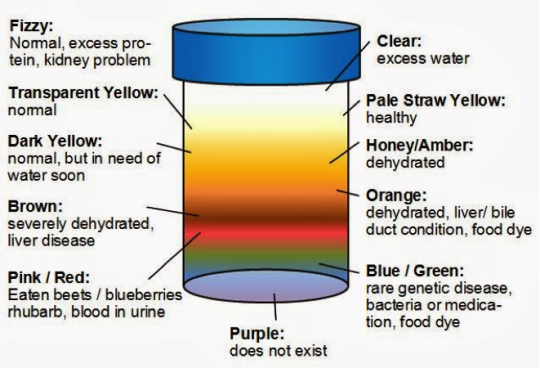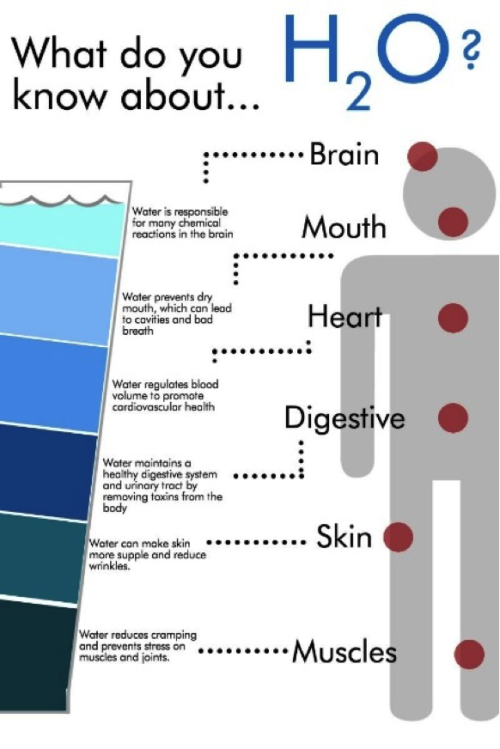
What Is Your Urine Trying to Tell You?
- Yellow? Orange? Brown? Find out what these colors mean for your health.
- 8 glasses a day isn’t the only way
- Your body knows when to H2O
Dear Reader,
“Hey, why is my pee brown?”
“Is there something wrong with me?”
“Wait, does this mean I’m not drinking enough water?”
“How much water am I supposed to drink?”
A few years ago when I was working in a hospital, this was a chain of questions I heard many times a shift. There were two reasons for this:
- 75 percent of Americans are chronically dehydrated.1
- All patients gave a urine sample at the time of admission. This means they were paying very close attention to what was going on with their urine.
While I always referred them to the charge nurse for the answer because she was in charge of their medical treatment plan, I really didn’t know what to tell them — I just drink when I am thirsty.
What I did know — many of the patients on my unit were severely dehydrated. And that certain colors meant certain medical tests were run rather quickly.
I will share what the various shades of urine could say about your health and the dangers of dehydration.
First, let’s talk about the ROYGBIV scale of urine and what it may indicate for your body.
![]() Fifty Shades of Yellow
Fifty Shades of Yellow
As you already probably know from firsthand experience, your urine isn’t always the same color.
The shade variations are caused by urochrome, a pigment that becomes lighter or darker depending on its concentration in urine.
Urochrome is the product of the liver, processing dead blood cells, and from the breakdown of bilirubin.
Often when you use the restroom for the first time after sleep, your urine can be darker than it typically is during the rest of the day due to the concentration of urochrome.
You know, that darker yellow that doesn’t show up again until the end of the day when you realize you haven’t had a glass of water since lunchtime.
As the infographic below indicates, you should probably get a glass of water soon, but you aren’t quite in the dehydration range of the scale.
But then there is that post-workout urination. This is the almost-clear and somewhat forceful pee you have after you have chugged down a liter during your run or aerobics class.
Both of these are pretty typical and healthy urination experiences — the different shades caused by your level of hydration.
Yet sometimes the color of your urine can hint that maybe things are less than perfect not only when it comes to your hydration level but other bodily functions.

The ROYGBIV scale of urine. Photo credit: tellyouall.com
On the hospital unit where I worked, many patients gave urine samples that were of the honey/amber shade. When this would happen, staff would tell the patient that they were dehydrated and that they should drink water. If it was cloudy or had a strong odor, the nurse would request a urinary tract infection screening as well.
But sometimes the patients’ urine samples were orange or even brown and sort of thick like a syrup.
When this happened, the doctor would immediately order a liver (hepatic) function panel blood test.
Why, you may ask?
Since urochrome is a product of liver functions, it can also be an indicator of liver disease. Many times, but not always, the panel results would show there was a liver issue.
If you are experiencing frequent dark or unusual urine, you should consult your physician.
Yet brown urine doesn’t always indicate a liver problem. Other reasons for dark urine include certain medications, certain foods, urinary tract infection, and kidney problems. But it could also simply be dehydration.
Dehydration can be a serious health condition on its own.
![]() Know Your H2o
Know Your H2o
Without the proper amount of water, you can experience fatigue, foggy memory, irritability, slowed metabolism, and increased risk of kidney stones. Water is also vital to keep regular bodily functions in check, like blood volume, brain function, toxin removal, and muscle support.
The most troubling part is knowing how much to drink.
There are many methods, like the “eight glasses eight times a day” rule or an ounce per pound of body weight. Either of these will likely work just fine, but the truth is your body knows what it needs.
The amount you drink really depends on your habits.
Robert A. Huggins, Ph.D., of the University of Connecticut explains:
Fluid needs are dynamic and need to be individualized from person to person. Factors such as sex, environmental conditions, level of heat acclimatization, exercise or work intensity, age, and even diet need to be considered.3

Figure 1: Water is a key part of a healthy body Photo credit: Iowastatedaily.com
Simply put, you should listen to your body. If you are thirsty, you need to grab a glass of water.
Also, be sure to take a look before you flush. If your pee is darker than a glass of lemonade, it’s time to take for a water break.
If you have any hydration hacks you would like to share, please do! nmoore@lfb.org
Live well,

Natalie Moore
Managing editor, Living Well Daily
Sources
[1] 75% of Americans May Suffer From Chronic Dehydration, According to Doctors
[2] The Science of Why Your Pee is a Yellow Color
[3] The Amount of Water You Actually Need Per Day
[4] 15 Outrageous Facts About The Bottled Water Industry
Written By Natalie Moore
Natalie Moore is a dedicated health researcher with a passion for finding healthy, natural, and science-based solutions. After a decade of direct healthcare experience in western and natural medicine, she was involved in public health research before joining Living Well Daily.
View More Free Articles
This Sleep Mistake Is Doubling Your Disease Risk
Think your inconsistent bedtime is just a harmless habit? Think again. New research reveals that going to bed at different times each night isn’t just making you tired—it could be dramatically increasing your risk of serious diseases. But the key to making sure poor sleep doesn’t derail your health goals likely isn’t what you think…....
Stop Obsessing Over Diet Trends
Can we stop with the endless diet debates already? Every other week there’s a new headline shouting about which diet is best for weight loss, heart health, or diabetes. Paleo, keto, low-carb, high-protein… it’s exhausting. And now, a new meta-analysis is out comparing the Mediterranean diet, the DASH diet, and something called AHEI (that’s “Alternative...
A New Reason to Ditch Processed Junk
If you’ve ever walked the inside aisles of your local grocery store and thought, “This is all just junk,” your instincts were spot on. A new study published in the journal Thorax just added another red flag to the list of dangers linked to ultra-processed food—a 41 percent higher risk of lung cancer. That’s right....
When Being Winded on Stairs Is Serious (And When It Isn’t)
I had an athlete visit me recently because he experienced shortness of breath while climbing stairs. He is in great shape, so he was worried about what it might mean. “Doc,” he said, “I run five miles three times a week. Why am I huffing and puffing after two flights of stairs?” His concern is...
Study EXPOSES Hidden Danger Lurking in Your Car
We think of our homes and cars as safe havens. But according to a startling new study, they may be flooding your lungs with microscopic plastic particles—every single day. Researchers in France recently found that adults inhale an average of 68,000 microplastic particles daily from indoor air alone. To put that in perspective, that’s about...
Mailbag: Is Modern Food Making You Snore?
“What can cause snoring, and is there a way to correct this issue?” —Seeking Silence Hi Seeking, Snoring happens when the soft tissues in your throat relax and vibrate as air passes through during sleep. While several factors can cause snoring—from sleep position to nasal congestion—I want to share one trigger that might surprise you....
Simple Food Swap SLASHES Dementia Risk 28%
Let’s be honest… who would jump at the chance to cut their dementia risk by 28 percent. And no, you don’t need to run marathons, survive on broccoli, or learn to play the zither (whatever that is) to make it happen. All it takes is one easy swap—something that’s probably already in your refrigerator. Researchers...
This SMART Floss Exposes Hidden Health Danger
Scientists have created dental floss that doesn’t just clean between your teeth—it also tracks your stress while you’re flossing. Now, I know what you’re thinking… “Great—now even flossing is going to stress me out by telling me how stressed I am.” But this fascinating new tool from Tufts University could be a game-changer for understanding...
Is This "Safe" Sweetener Damaging Your Brain?
The headlines are alarming… “Popular Sugar Substitute Linked to Brain Cell Damage” and “Erythritol Could Damage Critical Brain Barrier” are just two of the dozens I’ve spotted recently. But before you toss every sugar-free product in your pantry, let’s take a closer look at what this study actually shows—and what it doesn’t. The latest research...
This Summer Threat Could SPIKE Your Blood Sugar
Picture this… It’s another scorching hot summer day. You crank up the air conditioning while watching the weather forecast, which predicts yet another “record-breaking” heat wave. It’s starting to feel like just another miserably uncomfortable summer. But what you might not realize is that—if you have diabetes—those rising temps could do far more damage to...









